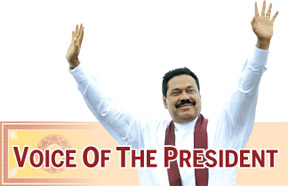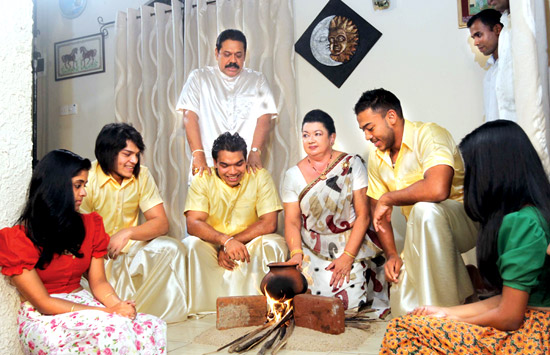|

Ideal New Year gift for leader who crushed terrorism:
President ranked sixth most influential personality
By Shanika SRIYANANDA
|

Milk boils over as a sign of prosperity
|
“The World’s Sixth Most Influential Personality. Isn’t the ideal New
Year gift for the leader for his astute political leadership?”
President Mahinda Rajapaksa, who proved that nothing is impossible if
there is a will and dedication, bridged the gap between the once divided
two communities Sinhala and Tamils - and received the prestigious New
Year gift the day after the Sinhala and Tamil New Year.
A poll conducted by the US based magazine TIME - listed President
Mahinda Rajapaksa as the sixth out of 100 most influential persons of
2011.
It is a co-incidence where that on the same day the UN Secretary
General’s panel, which released its final report on the alleged war
crimes during the final days of the end battle against the LTTE in May
2009, drew attention to the government’s accountability in handling the
end battle.
According to sources close to President Rajapaksa, the intention of
featuring him in the TIME polls was to create a negative image of him.
It is shown clearly in the brief introduction of him, which states:
“Since ending Sri Lanka’s 26-year-long war against the Tigers in 2009,
and grabbing control over once independent institutions such as
commissions on human rights and elections, Mahinda Rajapaksa has come to
dominate the institutions of his nation more than any other
democratically elected head of State.
He challenged the US., the European Union and the UN to prosecute him
for war crimes, confident that Russia, China and India would not support
it, the latter two have billions of investment at stake in Sri Lanka.”
The sources said the pro-LTTE Tamil Diaspora led a secret campaign to
make him unpopular to rank him at the lowest position. But, the
patriotic Sri Lankans, including the Tamils who were convinced of his
endeavours to liberate the country from the clutches of the LTTE
terrorism, had voted for him to defeat the pro-LTTE elements.
Being the very first Sri Lankan leader to be featured in TIME
magazine’s 100 Top Ten, he reached the sixth position ahead of all
powerful and popular figures of the world including famous WikiLeaks
creator Julian Assange, who has been ranked 11 in the polls.
Ranking as the sixth among the 203 personalities is not only his
personal achievement but a victory for the country itself.
This has endorsed his commitment to eradicate terrorism and also
drive the country towards a peaceful new era in the aftermath of a
deadly battle against terrorism that plagued the country for nearly 30
years.
The recognition by the TIME polls is also a tribute to a great Asian
leader who did not kneel down before the West. It is also a tribute to
the leader who trusted and believed in the unity among the Asian region
nation.
The most influential personality, according to TIME readers was Rain,
the South Korean singing sensation who commands a huge popularity in
South East Asia.
Among the political leaders who trailed far behind President
Rajapaksa were: President Hu Jintao of China (6,845 votes), Myanmar’s
Aung Sang Suu Kyi (3,384), US Secretary of State Hillary Clinton
(4,420), President Barack Obama (5,547), Israeli Prime Minister Benjamin
Netanyahu (1,496), India’s Congress leader Sonia Gandhi (1,107), UK
Prime Minister David Cameron (796) and US Vice President Joe Biden
((247).
The official online voting by TIME readers for the TIME 2011 closed
at midnight USA on April 14. However readers voting can continue to vote
for their favourites until the list is revealed on Thursday, April 21.
Launching the Central Bank Annual Report 2010 at the Central Bank
auditorium on April 11, the President said we live today in an
environment that was more free and prosperous and than in the past, as
well as where Sri Lankan individuality is protected, and the national
cultural aspects greatly embelished.
“We are today in an environment where economic progress moves
together with ethical values and the protection of a green and
sustainable Sri Lanka.
While we live under conditions that have an impact on the present and
future conditions of our people that can bring about productive changes
in all sectors, we have arrived here after a period of great challenge”.
“In 2005, the gross National Income of the country stood at a little
over USD 1000.
There were many problems facing the country. It was not possible to
have a clear image of the country’s future.
The number of people leaving the country, the businesses being
closed, the investments being taken away, the rising payments for
insurance coverage, the reduction in marker relations, the gradual
reduction of the coastline and narrowing of our territory were all
taking place, together with the daily decline in the value of the rupee,
as well as increasing corruption, highway robberies, crime and other
violence that went together with terrorism, that cast frightening
shadows on the country where no clear forward vision could be worked out
on a long-term basis in any sector of the country”.
“Due to terrorism that prevailed for more than three decades that led
to a background of political instability saw a rise in the levels of one
employment and poverty, and also pointed to the necessity for large
scale infrastructure development. Taking the entire economy as a whole
what could be seen was an environment of great instability.
Our main challenge was to achieve a high level of development that
would bring suitable returns in the short time to all sectors of
society. In the past, the solutions to the country’s problems were
sought within the context of a foreign framework.
As such we had to accept solutions that were suitable to those
countries.
We observed that a large sector of the economy was in the rural
sector. Although, a very large section of the population live in this
rural environment and the employment of a large segment of this
population were in agriculture, the major benefits of the country’s
economy were distributed in the urban sector.
Therefore, we realized that if the benefits of the economic progress
are to be distributed among large sections of the population, we should
look for solutions that are based on social foundations that give due
recognition to our national and indigenous feelings and culture, and
protects our national identity.
We also took action to develop agriculture, the fisheries sector, and
the small and medium industrial sector and launched large provincial
development schemes bringing considerable investments to key sectors of
public needs such as housing, drinking water, power, schools, health
facilities and education. We also activated important development
programs such as Uthuru Wasanthaya for the development of North and
Nagenahira Navodaya for the East.
All of these development tasks had to be initiated and carried out
while setting apart a large amount of national assets for the
eradication of terrorism. In addition to threats faced by every sector
of the economy from terrorism, we also had to repeatedly face the
challenges of floods, droughts, and the global financial and economic
crises. You are aware that overall impact of each and all of these
crises were unprecedented in the history.
We successfully faced up to all of these obstacles. As a result of
proper management of the battle against terror, we were able to bring to
an end a war that lasted through three decades.
In the year 2009, when the world economy saw negative growth,
developed and strong economies were crashing, some emerging economies
were declining; we were able to achieve a moderate growth rate of
03.05%. As the Central Bank states in its latest annual report, in the
last quarter in 2010 Sri Lanka was able to achieve a growth rate of
8.06%.
In 2010 our economic growth was 8%. The achievements we have gained
by now are great. We have today arrived at a time when the country’s
economic indices are at a high level never seen in our history and
stepping into a period of great prosperity. The entire population showed
great cooperation and commitment in achieving this economic success.
I am truly grateful to all of you for this.
Our expectation is to raise per capita income in our country to USD
4000 by 2016.
The per capita income that was USD 2053 in 2009 had risen to USD 2400
in 2010. This shows that we have already achieved considerable progress.
Accordingly, it is clear that achieving our targets will not be a
difficult task.
Together with this we have now achieved commendable successes in our
economy by having a historically high level of our foreign reserves, the
low level of interest, a low percentage of unemployment, the lowest
level of poverty; going above the targeted level of government revenue
for the first time, the annually declining ratio of government debts and
budget deficit, as well as the declining rate of inflation that is been
maintained on a long term basis. These can be considered major national
gains.
I believe that we must all work with great commitment to take these
victories forward. Our expectation is to take the assets of this city to
the village and to wipe out the gap between the village and the city.
In order to provide the same benefits enjoyed in the city the village
should be our singular target”, he said.
In the afternoon on the same day, students from the Ramanathan
Academy of Fine Arts of Jaffna University met President Rajapaksa at the
Temple Trees.
It was a memorable trip for those students as they had visited
Colombo for the first time in their lifetime.
Having warmly welcomed the students the President discussed their
experiences and their problems as well.
With the dawn of the Sinhala and Tamil New Year, President Rajapaksa
said that children should be given more opportunities to engage in New
Year celebrations so that they could be more conversant with the
country’s traditions.
“The New Year traditions coming down through centuries add to the joy
of celebration. We can give this joy to future generations by making our
children aware of its importance in our way of life”, he said.
The President said that country celebrated the New Year at a time
when the agricultural production was progressing rapidly together with
other areas of development.
“It was also the time for all people to enjoy the freedom dawned on
our motherland. The New Year will help bring about a renewal in spirit
and new expectations to the people on the future progress. We must
create every opportunity for our children to observe the many rituals
and traditions that are associated with the new year.
Therefore, to ensure the safety and joy of our children in
celebrating this event, I appeal to you all to keep away from
intoxicants during this festive season.
I trust this will contribute to bringing joy closer the children and
women of our country, he said extending his gratitude to the members of
the security Forces, police and Civil Defence Corps, as well as all
employees of the State and Private Sector who have made a commitment to
be at their posts during the festive season”.
The world’s sixth most influential person setting an example to
others had joined his family to observe the Sinhala and Tamil New Year
customs at his ancestral home, Carlton House in Tangalle.
Following the tradition the First Lady Shiranthi Rajapaksa facing the
north boiled the milk at the auspicious time, 1:06 p.m.
Thereafter President Rajapaksa fed milk rice to his three sons Namal,
Yoshitha and Rohitha.
Later they visited the People’s Bank and Bank of Ceylon branches in
Tangalle for the traditional money transactions.
The President yesterday participated in another Sinhala New year
custom, the oil anointing ceremony. |

